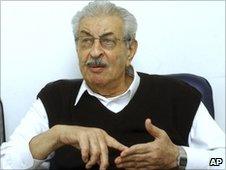Obituary: Mohammed Oudeh
- Published

Mohammed Oudeh helped plot the kidnap of Israeli athletes
Mohammed Oudeh, who has died in Damascus of kidney failure at the age of 73, was the Palestinian mastermind of the attack on Israeli athletes at the 1972 Munich Olympics.
Two were killed when members of Oudeh's Black September group infiltrated the Israelis' accomodation; nine others taken hostage died during a botched rescue attempt by German police as the Palestinians prepared to move them by helicopter. Five attackers and a German policeman were also killed.
From his home in Syria, Oudeh was always unrepentant about the attack.
Although he denied the plan had been to kill the 11 athletes, he repeatedly told journalists that the whole event had had a positive outcome for the Palestinians.
Oudeh's admission in 1999 of his role in planning the raid sparked a wave of outrage against the man who used the pseudonym Abu Daoud.
German police launched an investigation and he was barred from entering France where he had been arrested and released once before.
He was unable to ever go back to Ramallah in the West Bank, where some of his family continued to live.
But the end justified the means, he argued.
"Before Munich we were simply terrorists. After Munich at least people started asking: Who are these terrorists? What do they want?" he told the Associated Press news agency in 2005.
'Legitimate targets'
He told journalists how he and comrades from Black September had conceived the Munich scheme while smoking cigarettes and drinking coffee at a cafe in Rome.
They had been angry that the Olympic committee had rejected an Olympic team for the Palestinians, he said.
The idea had been to take the athletes hostage and trade them for more than 200 Palestinians jailed in Israel.
The Israeli athletes, he said, were legitimate targets as many had served in the military, fighting in the 1967 Six-Day War.
"Before Munich, nobody had the slightest idea about Palestine," he said.
Shot and wounded
Oudeh was born in 1937 in Jerusalem.
He fled to Jordan during the Six-Day War, where he joined the Palestinian Liberation Organisation (PLO).
After the 1972 attacks he moved to eastern Europe and then to Lebanon, until civil war broke out there in 1975.
In 1981 he escaped an assassination attempt. He was shot several times as he sat in a hotel cafe in Warsaw, the Polish capital.
He said the would-be assassin was a disaffected PLO agent in the pay of the Israelis, who was caught and executed in the 1990s.
But some historians say the attempt resulted from a split in the PLO.
Living in Damascus he kept a low profile, unable to visit his family for fear of being intercepted yet he remained defiant.
"Today I cannot fight you," he told AP, addressing the Israelis. "But my grandson will and his grandsons too."
Oudeh was buried in the Martyrs' Cemetery at the Yarmouk Palestinian refugee camp in Syria with officials from various Palestinian groups in attendance.
- Published3 July 2010